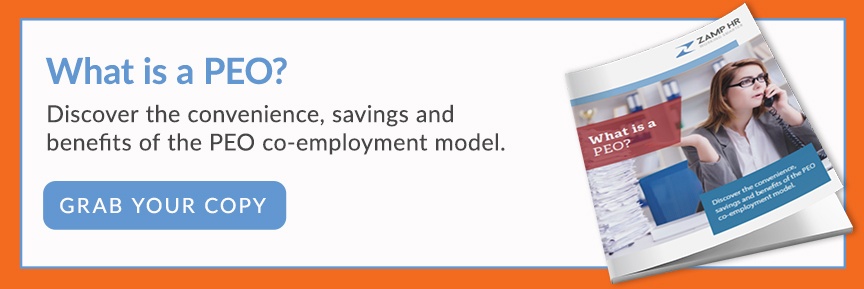One of the most critical factors in attracting the kind of high-level talent you need for your business is benefits. On top of that, non-compliance with involuntary benefits can lead to fees, fines, and even potential lawsuits. Unfortunately, many small businesses struggle to afford these benefits
The best way to reduce the cost of employee benefits is to outsource some of your HR functions to a Professional Employer Organization (PEO).
What is a PEO?
A PEO is a comprehensive HR outsourcing solution that uses co-employment to enable cost savings. Co-employment means that you retain full control of hiring, firing, and how your employees do their jobs. However, the PEO becomes employer of record for things such as taxes, compliance, and benefits.
The PEO does not replace your HR team, but does free them up to focus on core business goals.
Which Benefits Are More Affordable?
PEOs reduce costs for three types of benefits: Worker's Compensation, healthcare, and retirement.
Worker's Compensation Insurance
Worker's compensation insurance is a cost of doing business. Pretty much all employers are obliged to have it, but the cost can slow growth. PEOs can make worker's compensation insurance considerably more affordable by:
- Helping you with safety audits and training that reduce your risk of having an incident.
- Allowing you to access their experience modification rate. Because the PEO is employer of record, your employees are covered by their EMR, which is much more favorable.
- Setting up a return-to-work program. This allows injured employees to return faster on an appropriate light duty schedule, reducing the cost of claims and also allowing you to benefit from their experience.
Retirement Plans
Offering a good 401(k) retirement plan makes a huge difference for prospective employees. 81% of employees consider retirement benefits important, but only 50% of companies offer them. This makes a retirement plan a great way to stand out. However, they are also prohibitively expensive in terms of liability and administrative costs. PEOs can help with:
- Multi-Employer Plans (MEP). PEOs can act as a Multi-Employer Plan sponsor, sponsoring single defined contribution multiple employer plans. This means that the administrative responsibilities for the plan fall on the PEO, but the plan is available to all of their clients and client employees. MEPs are highly customizable, so you can set up the plan the way you want even while gaining the benefit of pooling with others.
- Reduced fees. Because of the MEP system and the fact that the PEO can leverage greater buying power, administrative fees are significantly reduced.
Healthcare
Substandard healthcare can cost you good employees. They may not even want to leave but may be forced to do so by life. Employers with 50 or more employees are required to provide healthcare, but all employers should do their best to do so.
PEOs can reduce the cost of healthcare in two ways:
- Master plans. A PEO has a master healthcare plan in which your employees can be enrolled. Because this is negotiated by experts and has a much larger pool of employees, the premiums are generally lower and the amount by which a claim can cause premiums to jump is reduced. You and your employees will pay less in premiums to get more in coverage.
- Wellness programs. PEOs can use their experience to help you set up a wellness program that will keep premiums down as well as reducing absenteeism and encouraging people to get preventive screenings.
How Else Does a PEO Reduce Costs?
A PEO also provides other significant cost savings. These include:
- Lower overhead. Instead of having to add another full-time HR employee and pay their full salary and benefits, you can merely borrow the time of experts your PEO already has on staff.
- Full HR compliance. Small businesses generally can't afford even a part-time compliance officer. PEOs can, and the expertise they can offer to all of their clients will help you avoid fines, fees, and possible employee lawsuits.
- Fewer administrative burdens. With the PEO taking care of things like benefits administration, payroll, and the tedious parts of employee onboarding, your employees can focus on core business priorities. In-house HR can focus on improving company culture.
- Being an "employer of choice." PEOs tend to increase employee satisfaction as well as improving benefits. This helps make you an employer of choice, with a good reputation that will bring potential employees to you. This will not only get you better talent but reduce the time and cost of hiring.
PEOs are the only HR outsourcing solution with an average positive ROI. Partnering with a PEO will save you money, save your HR staff time, and help you focus on growth.



